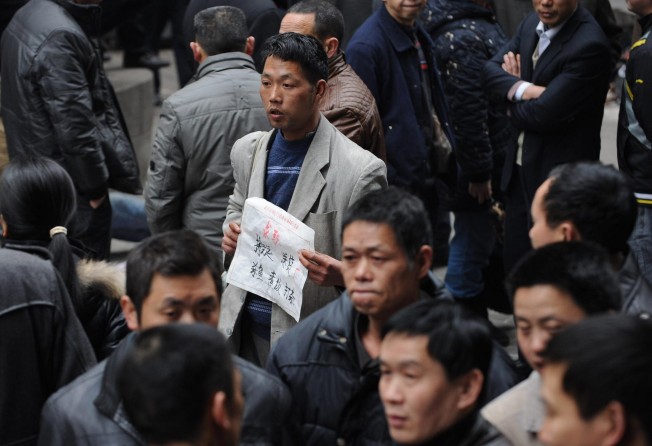
Migrant workers left out in urban cold
Chinese leaders' urbanisation push may favour creation of small cities to ensure balanced distribution of public resources

Every morning, Wu Wenjuan sends her son to a kindergarten in northern Beijing before riding a motorcycle to a hotel to work as a cleaner on hourly pay, a job she found through a popular internet portal.

Having stayed in Beijing for nine years, Wu is no longer a stranger to the capital of the world's second-largest economy. The only problem is she doesn't feel like a Beijinger at heart.
Neither does her official household registration, or hukou, put her down as one.
The red, palm-sized permit is proof that she's an outsider, a villager. She's excluded from many of the rights that city dwellers enjoy - from sending children to Beijing's public schools to getting paid through the urban social insurance for health care.
Also banned from mortgage loans, the family of three lives in a 15-square-metre shanty-town unit with a shared bathroom that comes for 1,000 yuan (HK$1,255) a month - eating up about half of Wu's wage.
"We won't live in Beijing for too long. Housing here is too expensive and affordable primary schools are too few," said Wu.
She is thinking of joining the family of her brother-in-law to buy a flat in Hengshui in Hebei province, where hukou control is more relaxed than in mega cities like Beijing while the quality of education is better than counties near her home town.
Stories of the likes of Wu suggest that Premier Li Keqiang's urbanisation push may not necessarily focus on creating new metropolises, but rather bridge the gap between smaller and bigger cities to allow more balanced distribution of resources.
There are growing signs that the mainland's urbanisation policy might favour a small-is-beautiful pattern as property prices in mega cities keep rising. The government has pledged to open household registration to migrant workers in smaller towns and cities in the initial round of the challenging hukou reform before gradually expanding to bigger cities.
"Reforms of the hukou system and other issues in the mainland's small and medium-sized cities may speed up in the next two to three years," said Chi Fulin, president of the China Institute for Reform and Development in Hainan, a think tank that has provided advice for the government for 20 years.
"If public resources and services are developed further in smaller cities, they will be able to offer more job opportunities and attract more migrant workers who face employment and housing pressures in major cities."
According to Societe Generale, one in three urban residents on the mainland does not have a local household registration, while migrant workers often receive only half or even a third of the pay of urban residents for the same jobs.
"Since 2010, evidence has shown migrant workers have avoided the coastal cities, deterred by costly housing, high living costs and the lack of access to social services," said Yao Wei, China economist at the investment bank.
The mainland hopes to generate huge consumption through the massive rural-urban migration to offset the fast-shrinking role of exports in driving growth, as part of Beijing's attempt to rebalance the economic structure. Currently, consumption accounts for less than half of the country's gross domestic product.
Factoring in the "floating population" of migrant workers, which is mostly rural, the mainland's urbanisation ratio hit 52.7 per cent last year. The government hopes to raise it to about 70 per cent in one or two decades.
Official statistics shows that every rise of 1 percentage point in the urbanisation ratio led investment to grow 3.7 percentage points and consumption to increase 1.8 percentage points in the decade to 2011. But high property prices and poor coverage of social benefits have held back migrant workers from spending.
Li Lailai, a worker at carmaker BYD's plant in Xian, Shaanxi province, said he usually saved about 70 per cent of his 2,000-yuan monthly income. Living in a 10 sqmetre room with a rent of 150 yuan a month, he said he killed most of his leisure time through web surfing.
State researchers say the government must first overhaul the country's unique pyramid-shaped administrative structure under which bigger cities at the bottom have control of more resources such as land quota for building hospitals and public infrastructure.
"Without enough capacity to attract investments, small cities will find it hard to create jobs. And without enough jobs, it's hard to attract migrant workers," said Qiao Runling, a vice-director at the China Centre for Urban Development. "People shouldn't have too high expectations on the effect of the urbanisation policy. There's no medicine that cures all diseases."